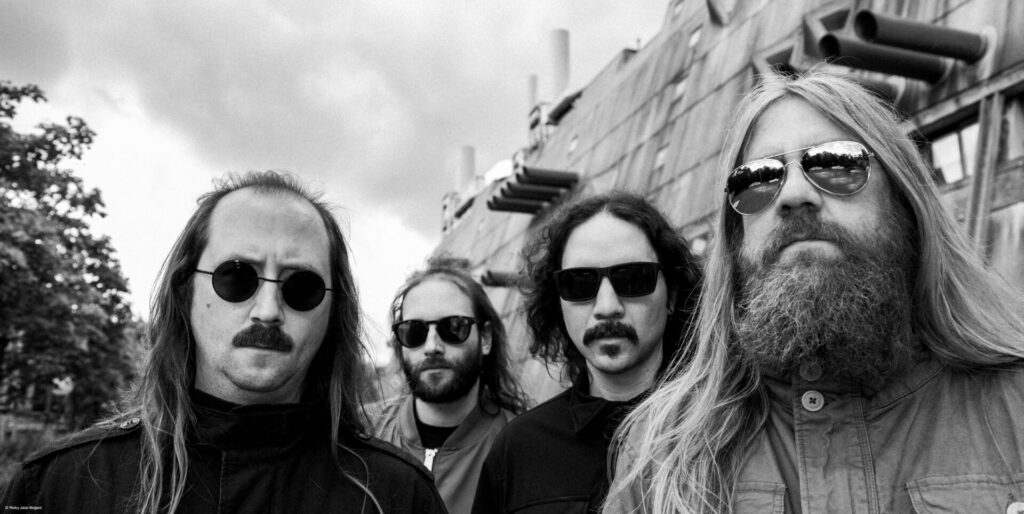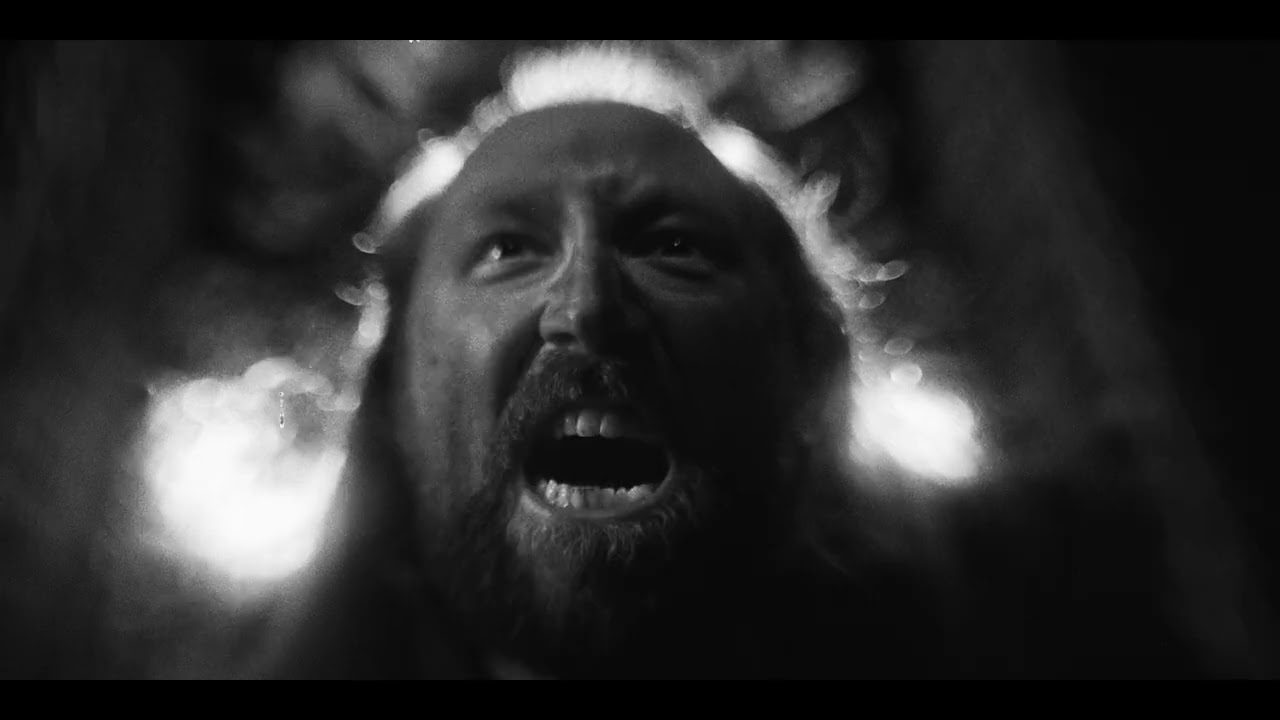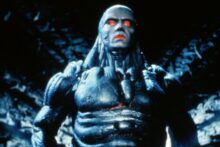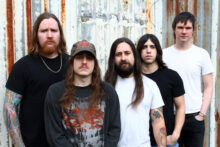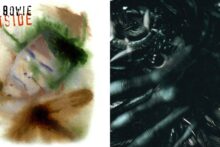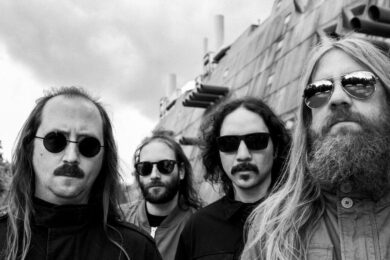The uninitiated might be unaware of death metal’s renaissance. But it’s been rumbling ever louder in the caverns of the underground. Just as OGs of the scene, Cannibal Corpse and Obituary, remain active and have even upgraded their venue sizes, new forms of the subgenre are crashing through to prominence. One of these is cosmic death metal, which shirks songs about the mutilation of the human body in favour of exploring broader metaphysical questions about human existence.
On 15 September last year, two of cosmic death metal’s forerunners released new music. Toronto’s Tomb Mold put out The Enduring Spirit, a surprise album that saw them lean heavily into the psychedelic polish of 90s spiritual predecessors, Cynic. The final track, ‘The Enduring Spirit Of Calamity’, contained a prolonged, repeating refrain with a crystalline guitar solo, pushing received notions about death metal into the outer reaches.
On the same day, Denver’s Blood Incantation released a 12-inch Maxi single called Luminescent Bridge. The title track was a mantra-like piece of synth music and clean guitar, picking up from the ambient experimentation of 2022’s Timewave Zero album. On A-side ‘Obliquity Of The Ecliptic’, they returned to the metallic furnace of their first two albums, 2016’s Starspawn, and 2019’s earth-shattering Hidden History Of The Human Race.
Originally conceived as a contribution to the Sub Pop singles series, and then radically expanded to nearly nine minutes in length, ‘Obliquity Of The Ecliptic’ saw Blood Incantation take flight. Its second half contained a classic rock guitar solo overlaying a tumultuous, warp speed metal underpinning. The second half of the song’s music video picked up where the video for Hidden History’s lead single, ‘Inner Paths (To Outer Space)’, left off four years earlier: barreling through the Big Black.
Time is a flat circle in Blood Incantation’s soundsphere. It’s as if all the music they’ve released over the years exists simultaneously in its own dimension. Their journeying into the far-flung corners of the known musical universe is an exploration of the tiniest particles that make up our reality, the big theories of existence, and our very consciousness.
“I’ve often said that a lot of bands, when they home in on their sound, they make the circle smaller,” says Blood Incantation drummer Isaac Faulk. “But as we home in on our sound, I feel like we’re making the circle bigger, and we’re adding more things.”
Luminescent Bridge functioned as just that – a connection to the band’s past that led to its indeterminate future. In Blood Incantation’s stunning new album, Absolute Elsewhere, we arrive at its destination. Comprising two tracks of 20 minutes plus, each divided into three musical suites (“tablets” as they call them), the album presents two sides of the same celestial coin. Absolute Elsewhere is the pinnacle of a career where every release has signposted extreme metal’s potential. It’s nothing less than the most significant death metal album since Morbid Angel’s 1989 classic Altars Of Madness.
Absolute Elsewhere is a destination recording in every sense. It takes you on a head-spinning trip. To make something this special, the band decamped to Berlin’s legendary Hansa studios to record with Arthur Rizk, perhaps best known for his production work with Texan thrashers Power Trip, and his own band, Sumerlands.
Blood Incantation’s thematic concern since 2015’s debut EP Interdimensional Extinction has been extraterrestrial influence on the progress of the human race and the interconnectedness of all life. Replanting themselves in the alien environment of Hansa helped shape the atmosphere of the new recording.
“The walls are just kind of imbued, almost like a perfume – something is just in there from decades and decades of people [recording there],” says Faulk.
The studios and control rooms in Hansa were Blood Incantation’s version of the inner chambers of the Great Pyramid powering the cosmos on Hidden History song ‘The Giza Power Plant’. The band saw where Brian Eno had scratched his name into the wall by the mixing desk when he was engineering David Bowie. The piano used on Bowie’s Hansa recordings was still in the studio, and found its way onto the album. Mics used during the production of Tangerine Dream’s 1979 Force Majeure album (probably worth about €35,000 now) were “just in the closet”, Faulk says, still in disbelief. Blood Incantation let it all seep into Absolute Elsewhere, hiring an additional €9,000 worth of synth equipment for good measure.
The band spent nine days solidly rehearsing the album material at the Noisy Rooms practise space in the city, playing it through 40-50 times. The weekend before they entered Hansa, they attended a Depeche Mode gig, along with 80,000 others, at the Olympiastadion. This performance was the climax of Depeche Mode Week in the city. The British synth pop group had worked on their albums Construction Time Again (1983), Some Great Reward (1984) and Black Celebration (1986) at Hansa. The studio was still offering Depeche Mode-themed tours the week Blood Incantation loaded in. The band was flummoxed when they got asked by some tourists whether they were, in fact, Depeche Mode themselves.
Blood Incantation’s hope for Absolute Elsewhere was, in Faulk’s words, for it to be a “big, epic, free, without bounds, kind of entity”. He had actually written the album’s A-side, ‘The Stargate’, before he wrote ‘Obliquity Of The Ecliptic’. But the recording of the latter saw both songs expand in size and scope, informed by an untrammelled desire for exploration of the band’s potential.
On ‘The Stargate’, torrential riffing gives way to a reverberant dub-like section, which evolves into a passage recalling the jam section of Pink Floyd’s ‘Echoes’. Fitting the mood is the most overtly Dave Gilmour-ish guitar solo yet laid down by Blood Incantation. And that’s just the first five minutes.
The second tablet of ‘The Stargate’ is a percolating synth sequence performed by Tangerine Dream’s Thorsten Quaeschning (who descended on the studio at a day’s notice to contribute to the album). The resonant acoustic guitars that follow, recorded in Hansa’s opulent and perfectly EQ’d marble room, are respite before the storm clouds gather again, in what Faulk describes as a “Voivod krautrock freakout”. He had to check in with the other members of the band whether this section wasn’t pushing things too far. Quite the contrary: it spurred them on to keep going in different directions.
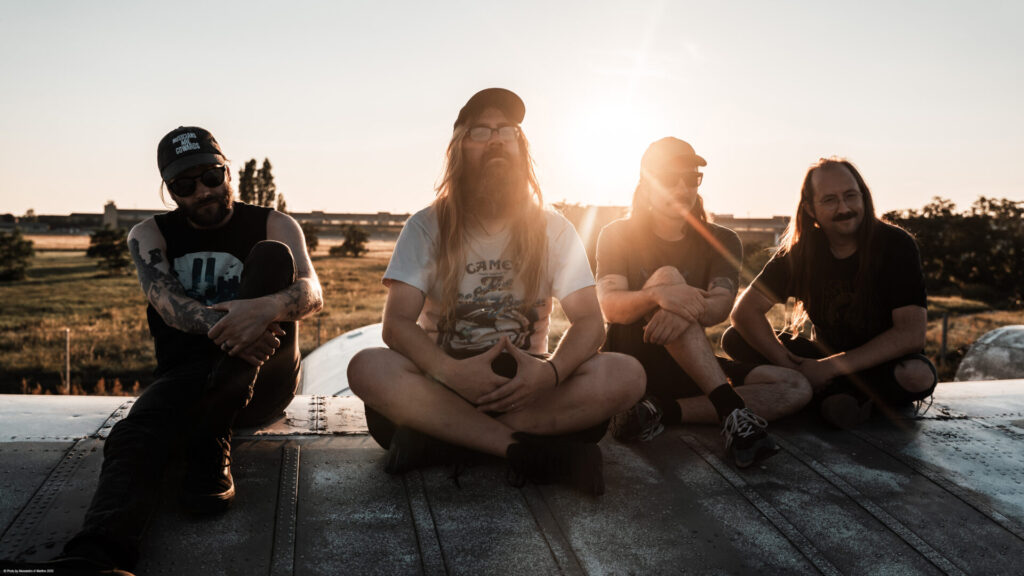
“Blood Incantation was, from the get-go, really interested in how extreme metal specifically, even outside of death metal (especially in the 90s and 2000s), was the music that was pushing in a bunch of different directions,” says Faulk.
‘The Stargate’ depicts a ritualistic destruction of the body in service to the boundlessness of astral knowledge. Written through by Faulk, with contributions from guitarist/vocalist Paul Riedl, guitarist Morris Kolontyrsky and bassist Jeff Barrett, Riedl’s lyric sums up the enterprise of the album as a whole: “All life is temporary; what lasts is Consciousness”.
Riedl and Kolontyrsky’s musical response is the album’s B-side, ‘The Message’. If ‘The Stargate’ is the culmination of Blood Incantation’s vision thus far, ‘The Message’ is the “absolute elsewhere” they are travelling towards. The song seems to simulate a war within extreme metal itself. Ecstatic black metal sections vie with mud-churning palm muting and, in the opening of its third tablet, one of the greatest thrash metal riffs of recent years. For all their lofty musicality, Blood Incantation can really bring the hammer down.
What Faulk describes as the psych rock section in the song posed him a particular challenge – when his shoe came untied in the studio. The measures were so oddly timed in that section of ‘The Message’ that, during rehearsals, Faulk followed the song on his computer so he could see where he came in.
In the studio, they recorded the song in one continuous 23-minute live playthrough, cutting the drums to tape. Faulk couldn’t have the computer alongside him, so had to count and feel his way into coming in at the right moment. Once he had, Faulk noticed his shoelace was untied, threatening to compromise his frenetic double bass drum playing. He had to dive down and re-tie it, pausing for two seconds in the process, whilst waving the rest of the band to keep going. It made the edit, and Faulk ended up finishing his drums early, on his birthday.
By contrast, Riedl spent five days with Rizk recording his vocals; the same amount of time it had taken to record Starspawn in its entirety. Riedl had written the lyrics to Absolute Elsewhere in a stream of consciousness, whereas he usually writes the words to fit the phrasing of his guttural vocalisations. But Rizk was keen to push him to try new things, and Riedl put in the work.
One of the happy accidents in vocal tracking was having the window open during Berlin’s summer heatwave last year. They captured a thunderstorm filtered through the tape echo, and with it the sound of happy Ukrainian refugee children from a nearby housing block playing in the rain. It gives the album a ghostly, transcendent climax – victims of human aggression enveloped by nature’s embrace.
The lyrics of ‘The Message’ really dive deep into the philosophical waters of the band, aspiring to a euphoric state in the moment. What Faulk describes as “intense clarity, oneness and acceptance of what things are.” This acceptance lays to rest the agitation of the song’s initial lyrical questioning: “If I am everywhere here, what is the all out there?”
“Part of what our music is trying to do is push those boundaries of not just genre, but also, whatever a band could be, whatever a band can do,” says Faulk. “We would talk about this stuff even over a decade ago. This was a big part of what Blood Incantation was about. Reconsidering our deep beliefs about where we come from, who we are…”
“Then where that kind of leads us into is an East-meets-West combination of philosophies and ideas,” he continues. “Consciousness as [more than] what Western science has deemed it as – just a happenstance amount of neurons firing, and that there’s not some deeper thing. That totally might be true, but I think as we delve deeper into that, it starts to seem like there’s a lot more, and there’s these deeper connections between all consciousness and all life.”
Name-checking philosophical gurus Alan Watts and Ram Dass, Faulks underlines that Absolute Elsewhere contains the most “New Age” themes that Blood Incantation has explored. When they have tackled questions of “where we come from, who we are” before, they have predominantly used science fiction. There are also the hugely popular, and highly contentious, pseudoscientific reference points concerning “paleocontact” in ancient cultures: possible extraterrestrial influence on world history and the origins of humanity.
Absolute Elsewhere is named after the 70s progressive rock band founded by keyboardist and flautist Paul Fishman, who assembled a group to record a concept album inspired by Erich Von Däniken’s 1973 book In Search Of Ancient Gods. The band included Phil Saatchi on guitar, younger brother of ad men Charles and Maurice Saatchi. Most notably, former King Crimson member Bill Bruford played drums as a session musician.
“Well, it was very much an accident,” Fishman said in a recent interview. “My father was friends with the publisher of Erich Von Däniken’s books. I had around this time become involved with electronic music. One day they were having a conversation about the possibility of making an album of music to accompany the books. I thought the suggested approach was wrong, and added a few comments about the type of direction, but did not think I would become involved. As King Crimson had just disbanded, I suggested maybe Robert Fripp would be interested in doing something. The next thing I knew was about a week later my father passed me the phone as he had contacted Robert. He already had other plans, but suggested that I contact Bill Bruford, which is how he became involved.”
Bruford has said that session work can be “incredibly irresponsible”. But, like the theories espoused in Von Däniken’s book, it’s tempting to see his involvement with Absolute Elsewhere’s 1975 album as an example of a higher musical intelligence supporting and improving Fishman’s enterprise.
In a weird coincidence, Absolute Elsewhere’s long-lost second album, Playground, was just released this year. It’s as if Blood Incantation’s invocation of the band in their album title, and circulating in the same space as Robert Fripp when he recorded with Bowie and Eno in Hansa, has unplugged a cosmic blockage to let these things come into material existence again.
As for Von Däniken’s rather defensive In Search Of Ancient Gods, he wrote it after sharp criticism of his first book, Chariots Of The Gods?. His work might sound niche, but the biography on the Penguin Random House website describes him as “arguably the most widely read and most-copied nonfiction author in the world.”
In the cold light of 2024, his theories of paleocontact accounting for the wonders of the ancient world (with added pictorial evidence!) appear daft, if not downright offensive. Where history is silent, opportunistic white supremacists have embraced the idea that ancient indigenous peoples had a helping hand/appendage from alien overlords.
One of the examples in the book are the stone blocks at the Inca fortress of Sacsayhuaman in Peru. How did the inhabitants, all those thousands of years ago, move and engineer blocks weighing up to 100 tonnes – “neatly cut stone monsters” as Von Däniken calls them.
The same question was tackled in a 2011 episode of the History Channel’s Ancient Aliens series. In the episode entitled ‘Aliens And Ancient Engineers’, we hear from talking-head authors and publishers of UFO magazine, The Ancient Alien Question and Technology Of The Gods. One has the job title “investigative mythologist”. They speculate about the use of alien laser technology to help cut the rocks, represented in imagery from the time as a “golden wedge” tool at the nearby ancient site of Ollantaytambo. More recently, Graham Hancock, author and presenter of Ancient Apocalypse on Netflix, has frequently appeared on Joe Rogan’s podcast to discuss his theory of an advanced ice age civilisation, now lost to “mainstream” history.
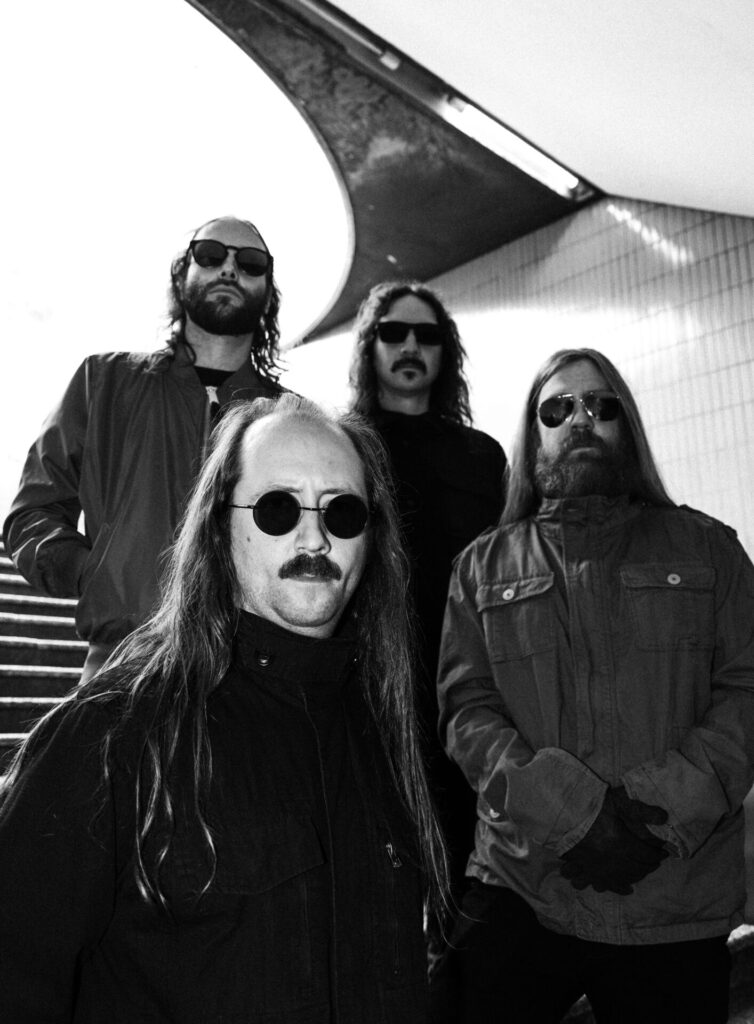
“Obviously, there’s the sci-fi and alien ideas,” Faulk says of the lyrics of ‘The Stargate’ and previous Blood Incantation fare. “But what I would say is that those ideas are really to get that human mindset out of your everyday acceptance of the status quo, or however your culture has told you things are.
“And I think what’s great about Graham Hancock, Erich Von Däniken, and any of these ideas – even if I don’t necessarily 100 per cent believe or agree with everything that they say – I think the main part is just questioning whatever we’re being told is our history as human beings. Because there’s so much amnesia [a term Hancock likes to use] in our species. So, from that questioning of society, whatever, I think that’s the first step, looking at that. Then you can start looking inwards and questioning yourself and your own consciousness and your own desires, and your own goals and all those things. Questioning even your most intensely held beliefs.”
The culture wars of recent years have taught us hard lessons about the promotion of toxic beliefs under the banner of “just asking questions”. But Blood Incantation explores these ideas with an exploratory lack of cynicism. There’s also an absence of ironical detachment in their musical approach, and a respectful consideration of the 70s progressive aesthetic, that otherwise could make work like Absolute Elsewhere feel kitsch and cobbled together.
But don’t let yourself think that classic progressive rock has somehow improved or redeemed death metal in Blood Incantation’s work. That’s the trap that Absolute Elsewhere sets for us. The pilgrimage to Hansa wasn’t about hoping that some of the studio’s stardust would shine up Blood Incantation’s music. The revelation of the album is not that interpolating retro prog rock moments into death metal makes it expansive and new, but that death metal itself is the contemporary revolutionary force prog rock once represented. Hansa studios was waiting for years to host a band as inherently progressive as Blood Incantation.
“In Blood Incantation riffs, I often think of them as the progressive, more intricate [form],” says Faulk. “We listen to stuff like King Crimson, but then we’re putting that into the metal riffing. So to me, that’s where the pushing of the boundary is.”
For Faulk, Stockholm’s Opeth were the first to overtly embrace the circularity of progressive influence in death metal, naming an album after a Comus lyric (1998’s My Arms, Your Hearse) and another after an obscure German prog band, itself named after a location in a Wilkie Collins novel (2001’s Blackwater Park). Opeth’s reimagining of death metal as a new form of progressive rock, with Steven Wilson at the helm as producer, showed that they could infuse their music with different flavours and remain a metal band.
Like the much-lauded Lankum, nominally a folk band, but one that incorporates droning and outright doomy atmospheres, Blood Incantation have every opportunity to take death metal to the broadminded masses. It’s still an ask: the harshness, complexity and blizzarding fury of their music creates a high barrier to entry.
But I look forward to seeing them perform at the Incineration Festival at London’s Roundhouse next May. The Roundhouse, like Hansa, is a site of circular significance, where the musical history encoded within its bricks could stir some ancient energies. It’s a new potential ritual chamber for Blood Incantation to conjure a vibration to send themselves, and their audience, well and truly skywards.
With Absolute Elsewhere, they now have the rocket fuel.
Absolute Everywhere is released by Century Media on 4 October

